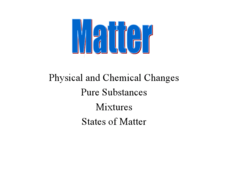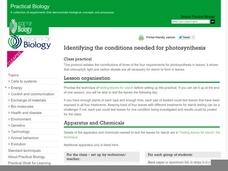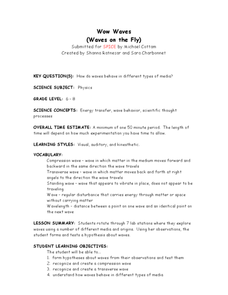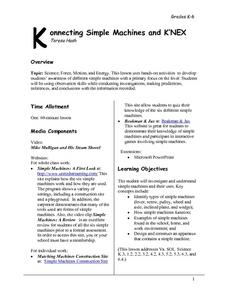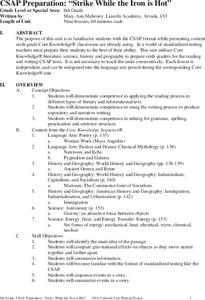Curated OER
Life in the Ocean
In this ocean worksheet, learners review the different life forms that can be found in the ocean and how these organisms are connected to each other. This worksheet has 12 short answer questions.
Virginia Department of Education
Equilibrium and Le Chatelier’s Principle
The best part of learning about equilibrium is that nothing changes. Young chemists observe four demonstrations during this lesson plan: equilibrium in a saturated solution, equilibrium with an acid-base indicator, equilibrium with...
Virginia Department of Education
Atomic Structure: Elements
It's all relevant, really. Individuals use the scientific method to learn more about elements, atoms, and their placement on the periodic table. They conduct experiments using materials common in nature to explore how elements affect our...
Curated OER
Elements and Compounds Vocabulary Quiz
In this science vocabulary activity, students draw lines to match 9 words pertaining to elements and compounds to their definitions.
Curated OER
Organ Systems
Students examine organisms that are composed of tissues, organs, and systems. They dissect a fetal pig and explore the assigned organs systems such as the skeletal, muscular, and circulatory organs. Students identify and explain their...
Virginia Department of Education
Work and Power
Assist your class with correctly calculating the values for force, work, and power as they determine the amount various activities require. They gather data and participate in a group discussion to compare results upon conclusion of the...
Curated OER
Matter
In a neat and straightforward manner, this PowerPoint delivers basic introductory information on the properties of matter, physical and chemical changes, and pure substances vs. mixtures. It also defines the states of matter. For some...
Nuffield Foundation
Identifying the Conditions Needed for Photosynthesis
Budding biologists often ask how scientists know what they do about different topics. In the lab described here, they have a chance to find out first-hand about the requirements for photosynthesis. Three sequential investigations are...
Curated OER
Energy in the Form of Calories
Pupils calculate the amount of food calories found in an individual peanut. In small groups, they set up the experiment so that a burning peanut will heat water above it. Using the temperature change and volume of the water they...
Curated OER
Minerals Prime
In this minerals learning exercise, learners answer fifteen multiple choice questions about mineral formation, volcano and mountain formation, mineral tests and properties of minerals.
Curated OER
Wow Waves (Waves on the Fly)
Middle schoolers formulate hypotheses on wave behavior and test them. In this physics lesson, students compare and contrast transverse and compression waves. They determine the wavelength of transverse waves.
Curated OER
Rate of Photosynthesis
Students investigate the rate of photosynthesis using elodea leaves. In this photosynthesis lesson plan, students place elodea in a test tube filled with water. They include baking soda and place the test tube under a lamp. Students...
Curated OER
Konnecting Simple Machines and K'Nex
Learners study and identify different types of simple machines and how they work. They design a simple machine.
Curated OER
The Properties of Metals
In this properties of metals worksheet, students read about the history of metal use and their properties. Students read about metallic bonding and answer three questions about bonding in metals.
Curated OER
What Information is on the Periodic Table?
In this elements worksheet, students review the information that is found on a periodic table including atomic mass, chemical symbol, atomic, number, and electron configuration. This worksheet has 7 fill in the blank questions.
Curated OER
Why are Electrons Important?
Students write electron configuration of elements using atomic numbers and they identify valence electrons. For this electrons lesson plan, students observe a demonstration showing the space-filling property of an electron. They also...
Curated OER
How Do Atoms Stick Together?
In this chemical bonding worksheet, students answer 10 questions about ionic bonding, covalent bonding, metallic bonding, Lewis structures, and intermolecular forces.
Curated OER
Light
Students explore light. In this light wave physics lesson, students construct periscopes, kaleidoscopes, color wheels, and pinhole cameras. Students observe and record characteristics of light demonstrated through the use of...
Curated OER
Effects of the Sun on Our Planet (Grades 2-4)
Students observe how the sun's rays can cause evaporation and discuss its role in the weather cycle. They discover what the sun's energy brings to plants. They examine how different types of technology can enhance the amount of solar...
Curated OER
Fossil Fuels-Importance and Formation
Student is introduced to the concept of energy as a common factor among all things. They list three fossil fuels and describe how fossil fuels were formed. They then tell how much plant debris it took to form one foot of coal.
Curated OER
CSAP Preparation: "Strike While the Iron is Hot"
Students survey several concepts in literature, science, history, and geography as a preparation for the CSAP standardized testing experience. This nine lesson unit provides exposure to the format and content of the test.
Curated OER
Melts in Your Bag, Not in Your Hands
Students study how the sun transfers heat to the earth through radiation. They examine how animals absorb energy from the sun to warm their bodies by experiment with chocolate melting. They examine sun safety.
Curated OER
States of Matter
Students explore the states of water. In this physical science lesson, students use ice and dry ice to observe the changes in the state of matter. Students record the results.








